The Woman Who Died A Lot
by Jasper Fforde
[Audiobook, Book]
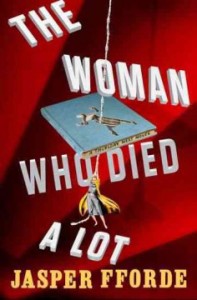
view/request
This latest entry in the Thursday Next series of genre-bending literary absurdist fantasy adventure novels is immensely satisfying. Fforde doesn’t miss a chance for a farcical or pun-driven punchline; the twists and knots and mobius strips in the overlapping plot lines make perfect sense in the impossible logic of his alternate world, despite (or because of) which, they still provide surprises. Thursday has been pushed into semi-retirement but nevertheless manages to be at the center of the action, valiantly trying to save the world from Goliath Corporation (mission statement: to own everything and control everybody), the smitings of a wrathful deity, asteroid collisions, overdue library books, and genetically engineered fake versions of herself. The reader on this Recorded Books version has done a brilliant job of voicing the many characters and pacing the reading with a deadpan nonchalance.
Reviewed by Faith
Tagged: Fantasy, Fiction, Humor, Literary fiction
Sarah’s Key
by Tatiana de Rosnay
[Book]

view/request
This emotionally laden story starts off with two alternating voices. Julia Jarmond is an American-born journalist, who has been living in Paris for 20 years, complete with a French family, and a marriage that is increasingly unstable. She is tasked with writing the story of the 1942 Vel d’Hiv Jewish roundup by the French police on the 60th anniversary of that difficult but little known episode in French history. We also see the roundup from the perspective of Sarah, a 10-year-old who is taken to the Vélodrome d’Hiver with her family, but without her younger brother. The stories of these two lives converge, with a key unlocking many long-buried secrets. This is a story that will stay with you.
Reviewed by Molly
Tagged: Fiction, France, Historical fiction, World War II
Midnight in Peking
by Paul French
[Book]
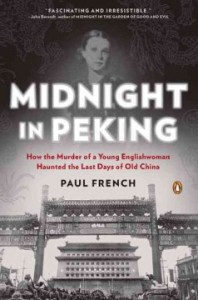
view/request
In 1937 foreigners and native Beijinger’s alike were shocked when the mutilated body of a young woman was found just outside of of Beijing’s Legation Quarter. Clearly, a terrible crime had been committed, but what had happened? The investigation was complicated by the bureaucratic system that made it difficult for law enforcement in the Legation Quarter and in Chinese Beijing to work together and the detectives in charge of the case struggled with a lack of information and communication—and what seemed all too often to be pure obstructionism from above. Paul French’s Midnight in Peking offers a fascinating glimpse of China at beginning of the Second World War, a time when powerful Europeans were leaving China, and many refugees were arriving in Beijing and nearby cities, fleeing from the USSR and Nazi Germany, and from the increasingly hostile and militaristic presence of the Japanese within China.
French’s narrative follows both the official investigations, and the unofficial investigation conducted by the victim’s father. There are some surprising twists along the way, and French takes advantage of them to keep the reader on her toes. An engaging read, but not for the squeamish or those who prefer to read stories in which justice is fulfilled.
Reviewed by Ben
Tagged: China, History, Non-fiction, True crime
How To Sharpen Pencils
by David Rees
[Book]
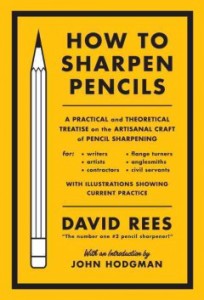
view/request
Humorist/artisanal pencil sharpener David Rees carefully guides us through the various #2 sharpening techniques and the history of the famed utilitarian instrument. The book, half manual/ half comedic piece, is both instructional and hilarious. Rees provides information on setting up a pencil sharpening workshop, pre-sharpening stretches, fancy pencil sharpening routines and of course, sharpening styles and techniques.
Note: this volume is not recommended for fans of mechanical pencils or electric sharpeners!
Reviewed by Jason
Tagged: Humor, Non-fiction, Pencils
The Professor and the Madman: a Tale of murder, insanity, and the Making of the Oxford English Dictionary
by Simon Winchester
[Book]
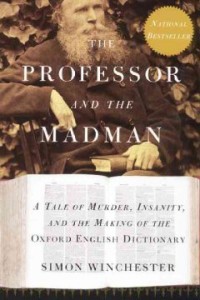
view/request
The creation of the Oxford English Dictionary containing 414,825 definitions was begun in 1857 and took 70 years to complete. The first edition of the OED was given to President Coolidge and is in the Calvin Coolidge Presidential Library & Museum at Forbes Library. The “Professor” is James Murray, a former schoolmaster and bank clerk, and the editor and leader of the OED project. The “madman” is Dr. W. C. Minor, a retired American Civil War surgeon who was the largest contributor with over 10,000 entries to the OED project.Minor was an extraordinary contributor but he was also a murderer, clinically insane, and incarcerated in Broadmoor, England’s asylum for criminal lunatics. Winchester tells the history of the dictionary as well as the biographies of Murray and Minor. While parts are long-winded, the story of the dictionary appeals to those who love words, books and libraries. The biography of Minor appeals to those interested in the mind, behavior and psychology. Readers who enjoy psychological fiction and are looking for a non-fiction bookmight also enjoy this.
Reviewed by Julie
Tagged: Biography, Dictionaries, Non-fiction, Psychology
How Music Works
by David Byrne
[Book]

view/request
“I think I managed to give a sense that the world of music is wider than my personal experience, but my experience figures in here too”, David Byrne writes about his recent book How Music Works, and this statement gives you a very good idea of what you will find in this very enjoyable book. How Music Works explores the world of music through the experience of one musician’s experiences and wide ranging thoughts. As a result, it is neither a comprehensive book on the nature of music nor a complete biography of its author, though it combines elements of both. Byrne explores the history of music and musical thought, the influence of technology and economics on music, the role of music in society, and the future of the music industry. Along the way we learn much of Byrne’s career, his own approach to music, art, and performance in general.
Byrne is an excellent writer, and a man with wide ranging and interesting ideas. Reading How Music Works is a pleasure, and left me with an increased urge not only to explore more of his music and to read more of his writing (Forbes Library also owns his Bicylce Diaries), but most of all, to make more music of my own. It is, above all, David Byrne’s unending enthusiasm for everyday creativity and for the participation of everyday people in the world of music that will make the greatest impression on you. A great book which will be enjoyed by music lovers of all types.
Reviewed by Ben
Tagged: Music, Non-fiction, Pop music
Maigret and the Yellow Dog
by Georges Simenon
[Book]
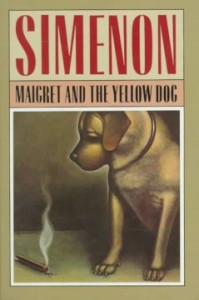
view/request
A wine dealer is shot and wounded via gunfire through a mail slot, traces of poison are found at the Admiral Hotel, a mysterious waitress keeps reintroducing herself as the plot thickens, the footsteps of a giant are discovered, a doctor is having a nervous breakdown behind bars, the mayor is acting rather suspicious, a customs official is shot in the leg and a large, wandering yellow dog is present at the crime scenes. What does it all mean???
Fear not, international mystery fan. The laconic, pipe smoking, French speaking inspector Maigret is on the case!
Reviewed by Jason
Tagged: Fiction, French, Mystery, Police procedural
Fifty Sides of the Beach Boys
by Mark Dillon
[Book]

view/request
Mark Dillon’s book is an entertaining look at fifty Beach Boys tunes. The selections are listed chronologically and an admirer (most often a musician) shares a personal memory attached to each song. Some contributors were colleagues and spent time with the guys, others grew up listening to the records. The surviving Beach Boys are also among the fifty selected. In addition to the recollections, Dillon provides historical recording notes, songwriting origins and wonderful Beach Boys factoids.
Memorable bits for me come from the Byrd’s Roger McGuinn on “Don’t Worry Baby”, Beach Boys session player Carol Kaye “California Girls”, actress/musician Zooey Deschanel on “Wouldn’t It Be Nice”, director Cameron Crowe on “Feel Flows” and brief-Beach Boy Blondie Chaplin’s take on “Sail on Sailor”.
Reviewed by Jason
Tagged: 1960s rock music, Biography, Pop music
The long earth
by Terry Pratchett and Stephen Baxter
[Book]
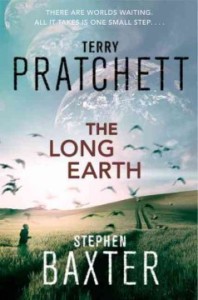
view/request
As a longtime Pratchett fan, I was looking forward to a fantasy full of humor and parody. This isn’t it, but I’ve been drawn in and am still reading. Stephen Baxter is known for his prolific science fiction novels. The Long Earth posits an infinite number of other worlds just like ours, each in its own universe–except they are completely undeveloped by humans. In the very near future, a reclusive scientist develops a way to step between worlds by building a “stepping” box so simple any teenager can make one. Large numbers of people begin popping back and forth, creating complex consequences and changing the world(s) in ways that no one can keep up with. I’m enjoying interesting characters such as 13-year-old Joshua, who is more comfortable in the primordial forest of other Earths than in his hometown of Madison, Wisconsin, and a computer in the shape of a vending machine named Lobsang who claims to be a reincarnated Tibetan motorcycle repairman.
Reviewed by Faith
Tagged: Fiction, Science fiction
Stones for Ibarra
by Harriet Doerr
[Book]
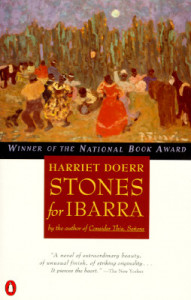
view/request
Stones for Ibarra tells the story of Sara and Richard Everton, who have moved from California to the remote and small village of Ibarra, Mexico to reopen Richard’s grandfather’s copper mine. They have been lured there by photographs and the tales of older relatives: “They have experienced the terrible persuasion of a great-aunt’s recollections and adopted them as their own. They have not considered that memories are like corks left out of bottles. They swell. They no longer fit.” Instead of the beautiful grounds and tennis courts, they come to a house which no longer has shingles and a mine that has been flooded. They persevere, and get the mine up and running, having a large affect on the village and villagers. We learn of Sara’s experience with the villagers, although they always remain slightly apart, and her experience of her husband’s illness.
One of the most remarkable things about this book is that it was published when the author was 73 and won the National Book Award, which means I still have time to publish my own novel!
Reviewed by Molly
Tagged: Fiction, Mexico
George Harrison: Living In The Material World
by Olivia Harrison
[Book]
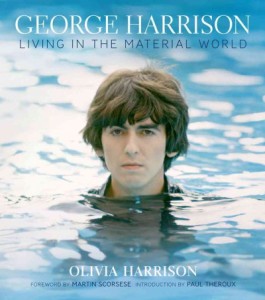
view/request
The gorgeous and painstakingly assembled Living in the Material World book is a companion to the Martin Scorsese documentary of the same name. It’s a thoughtful collection photographs and essays with the subject being the late George Harrison.
Not only do we have large color and black and white photographs of George from childhood up until his last years, the book features the musician’s handwritten letters and lyrics, personal photographs and collected ephemera. His career as a musician, childhood, family life, friendships and spiritual life are recollected. Scorsese, Paul Theroux, Eric Clapton and Dhani Harrison are among the many contributors. Living in the Material World works both as a engrossing read and/or a picture flipper.
Reviewed by Jason
Tagged: Beatles, Biography, Music, Non-fiction
Trippin’ with Terry Southern
by Gail Gerber with Tom Lisanti
[Book]
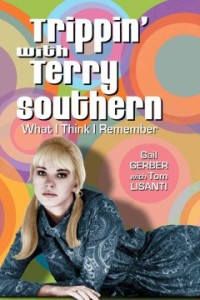
view/request
Gail Gerber’s memoir recalls her time spent with the famous novelist and screenwriter Terry Southern (Dr. Strangelove, the Magic Christian, Blue Movie, Candy, etc.). Despite the title, the book is not filled with madcap, drug taking adventures. Rather, we see an intimate portrait of a couple’s life together through a thirty year period. It also focuses on Southern’s idiosyncrasies, humor and career highs and lows.
Gerber, a stage actress and ballet dancer, also shares several of her professional and personal experiences ranging from early 60’s appearances in Beach Ball, The Loved One and a couple of Elvis Presley films to life as a casual farmer.
Trippin’ with Terry Southern is an interesting memoir and is certainly essential read for Southern fans. In addition, those who enjoy reading about 1960’s and 70’s escapades will be really enjoy the memoir… just peak at the back index to see a list of all of the exciting characters who will pop up (there’s Dennis Hopper, Rip Torn and Stanley Kubrick just to name a few)!
Reviewed by Jason
Tagged: Biography, Film, Memoir, Non-fiction












